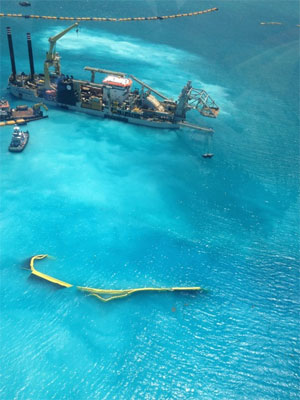 The government brought a resolution to the House of Assembly to borrow $465 million to finance the projected revenue shortfall in the 2013/2014 fiscal year.
The government brought a resolution to the House of Assembly to borrow $465 million to finance the projected revenue shortfall in the 2013/2014 fiscal year.
This would add to the $650 million the government borrowed this year.
Government debt as a percentage of GDP is projected at 53.1 percent at the end of this current fiscal year and 56.4 percent at the end of 2013/2014.
According to figures attached to the budget communication presented in the House of Assembly yesterday, the national debt stood at just under $5 billion in 2012. That is 61 percent of GDP.
Prime Minister Perry Christie said much of the money the government borrowed last year was required to cover unpaid financial commitments incurred during the Ingraham administration.
“The legacy of high public deficits and spiraling debt burden that we inherited is brutally onerous: almost one out of every four dollars in revenue collected by the government must be allocated to pay the interest charges on the public debt and cover the debt repayment,” said Christie as he presented the communication.
“Had we chosen to ignore the grave structural imbalance in the public finances, the debt would have continued to spin out of control.”
During a press conference in the Majority Room following Christie’s communication, Minister of State for Finance Michael Halkitis told reporters the government is committed to lowering its level of borrowing.
“We have introduced…a medium term strategy where we are gradually consolidating and putting the finances on better footing,” he said.
“…We have to do it gradually so that we don’t put too much shock into the economy, and so while we are borrowing additional funds we are happy that we are moving in the direction where we are borrowing less.”
Despite the high level of borrowing, Christie pledged to return the budget to a surplus by the 2016/2017 fiscal year.
Christie said he expects revenue will be bolstered in part by the tax reform package announced in February.
The government proposes to add 15 percent value added tax (VAT) on various locally produced goods and services.
Christie said that measure, among other revenue enhancing initiatives, will “contribute to a significant improvement in the revenue yield of our tax system”.
As a consequence, he said the government expects to be able to meet the fiscal objectives of its medium-term plan, which includes the eradication of the deficit on the recurrent account and the GFS deficit by 2015/2016.
In addition to that, Christie said the primary deficit will be eliminated by 2014/2015, which he said “is critical to reversing the upward trend in the debt to GDP ratio”.
Additionally, he said “government debt will return to a level in the area of 50 percent of GDP by 2016/2017, as opposed to a level approaching 70 percent in the absence of our decisive action plan to redress the public finances.”
Asked if that plan is realistic given the current economic climate, Halkitis said the government is already on the path to making those goals a reality.
“Earlier this year we indicated to all agencies and departments that we needed them to be more disciplined and more thorough and to identify savings in their budgets,” he said.
“We have been very successful with that and we’ll give you more details, but we’re happy with the results of that. We believe that if we continue on a disciplined and focused strategy that we’d be able to get things done.”
As the government seeks to introduce measures to improve revenue collection, Christie revealed that the revenue collection for the current fiscal year is expected to trail earlier projections by $170 million.
He said recurrent revenue is expected to come in at $1.380 billion, down by 11 percent from the $1.550 billion budget projection.
However, he said the government succeeded in containing the recurrent expenditure in 2012/2013 to an estimated level of $1.659 billion, which is down by $162 million from the budget projection.
He added that capital expenditure should be in the region of $350 million, down by $50 million from the budget estimate.
As it relates to the upcoming fiscal year, Christie said recurrent
expenditure is projected to be $1.737 billion.
Capital expenditure in 2013/2014 is projected to be $295 million and recurrent revenue in 2013/2014 is projected at $1.503 billion.
“As it stands, the GFS deficit next year will reach $443 million or 5.1 percent of GDP, as compared to the estimated outcome of 6.1 percent of GDP this year,” Christie said.
He said the government must continue to strive to be more cost effective in the management of its operations as it seeks to decrease the county’s debt and increase revenue.
The budget debate is expected to begin next week.
By Krystel Rolle
Guardian Staff Reporter



